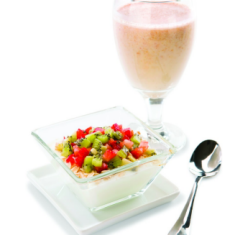Healthy Snacking
November 01, 2014
Healthy snack choices can make a dramatic difference on your healthy lifestyle journey. Nu Skin recommends incorporating a morning and afternoon snack about one to two hours after meals. But how do you know what the best snack choices are? Here are a few tips to help guide your decisions.
GRAVITATE TOWARD VEGETABLES
Vegetables make a great snack! The fiber they provide will help you feel satisfied. To avoid food fatigue, choose a variety of vegetables—your snack doesn’t have to be all one kind. If you struggle to eat fresh vegetables, try adding a little bit of peanut butter or other nut butters. These can be a healthier alternative to traditional dressings and they provide a little extra protein to aid in satiety. You can also lightly steam your vegetables if you need a little change.
High fiber vegetable options: Broccoli, Carrots, Cauliflower, Spinach, Zucchini
FAVOR FRUITS
Like vegetables, fresh fruits are also a great source of fiber. Try eating a portion of fruit for one of your snacks. The natural sweetness of the fruit is a healthier choice than sugary snacks but still leaves your taste buds satisfied. To mix things up, add a tablespoon of plain Greek yogurt to your fruit. The tanginess of the Greek yogurt complements the sweetness of the fruit, and the protein in the yogurt helps you feel full.
High fiber fruit options: Apples, Berries, Pears, Papaya, Oranges
SEEK NUTRITIOUS SNACKS
Although fruits and vegetables are the ideal snack choice, here are a few other options if you really need a change:
· A hardboiled egg
· 1–2 tablespoons of raw, unsalted nuts
· Low fat or no fat Greek yogurt
· Low fat cottage cheese
· Low fat cheeses
Good luck and healthy snacking!
SOURCES
Wilson GJ, Moulton CJ, Garlick PJ, Anthony TG, Layman DK. Post-meal responses of elongation factor 2 (eEF2) and adenosine monophosphate-activated protein kinase (AMPK) to leucine and carbohydrate supplements for regulating protein synthesis duration and energy homeostasis in rat skeletal muscle. Nutrients. 2012 Nov 13;4(11):1723-39. Free full text available here: http://www.ncbi.nlm.nih.gov/pmc/articles/PMC3509516/
Wilson GJ, Layman DK, Moulton CJ, Norton LE, Anthony TG, Proud CG, Rupassara SI, Garlick PJ. Leucine or carbohydrate supplementation reduces AMPK and eEF2 phosphorylation and extends postprandial muscle protein synthesis in rats. Am J Physiol Endocrinol Metab. 2011 Dec;301(6):E1236-42. Free full text available here: http://ajpendo.physiology.org/content/301/6/E1236.full.pdf+html
Photo by Pixabay
You Might Also Like:
-
The comprehensive ageLOC TR90 program consists of innovative ageLOC products, a simple eating plan and active lifestyle tips. Maintaining an active lifestyle plays a key role in weight management by affecting several aspects of your mind and body, including areas targeted by the TR90 program—mood, healthy metabolism and lean muscle mass.
-
According to Oxford Dictionary, a superfood is a nutrient-rich food considered to be beneficial for health and well-being. A food’s nutrient density is what determines if a food is considered super. Nutrient density refers to the amount of nutrients packed into a small volume of food.

